- Home
- Sandra Chastain
Imaginary Lover Page 4
Imaginary Lover Read online
Page 4
“Why’d she do it, Merlin?”
“I don’t know. I don’t even know why she took me in. That was Hattie. She just burrowed past the surface and found the pain. It was her way of feeding her own energy, finding a need for her help.”
“Hattie was like a magnet, seeking the lost ones and bringing them back to life. Except for my mother.”
“What happened to her?”
“Drugs, alcohol, hepatitis. Any one, or all three. Who knew? What’s your claim to pain, Doc?”
“I caused a wreck in which my wife was killed.”
“So, were you drunk or something? Why the guilt?”
Nick’s hands tightened on the steering wheel. He’d never answered that question for Hattie; he couldn’t imagine why he was formulating the words for this tough-looking woman.
“No, not drunk, just overcome with a stubborn, unreasonable ambition.”
“I never arrested a driver for ambition.”
“I’d worked twenty-four hours straight in Emergency. My wife was a nurse. She knew I was too tired to keep going. She urged me to let someone else take over. But I was Superman in scrubs. I was becoming more famous by the day. I was immortal. My patient died.”
“So, no doctor can save them all,” Dusty said softly.
“I thought I could.”
“And what happened?”
Nick hesitated, then went on. “She wanted to drive, but I refused. I was full of anger and flying high on adrenaline. It was raining. I was driving too fast. You know the rest. She died, and I was in a coma for months. When I finally came out of it, I learned that she’d been expecting our child. I wanted to die. Hattie knew it, and she wouldn’t let me.”
“So, why don’t you get back to work? You look okay now.”
“I’m not!” he snapped, then let out a deep breath. “I’m just not ready to go back yet. Besides, Hattie needed me, and it was the least I could do.”
They turned into the park and were waved past the guard’s station when he saw the sticker through the car window. Nick drove along the wooded road, past beds of late-blooming flowers and joggers running along the wide sidewalks. Among the green pine trees, the leaves on the hardwoods were turning, dropping splashes of red and orange to the ground in a patchwork quilt of color.
“The first time I ever came here,” Dusty said, “we rode a train that ran around the mountain. There were passengers dressed in costumes; girls in hoop skirts and men in frock coats. At one point Indians attacked the train, running down the aisle and kidnapping one of the women. It scared the pants off me.”
Nick grimaced. Seeing this woman’s legs without pants was becoming too constant a thought. She pulled the cap she’d been wearing from her head, allowing long straight blond hair to fall free across her shoulders. There was something symbolic about that gesture, as if she were freeing herself as a woman when she let her hair loose.
The fall breeze caught its strands and whipped them behind her, revealing a flush of color on a face that was too lean and too exposed.
“The Indian attack doesn’t take place anymore. Probably politically incorrect. I guess the plantation wasn’t here when you came.”
“I don’t know. If it was, we didn’t see it.”
“Well, it begins here, behind this fence. You can see the new Cobb house on the left. They’re restoring it as they get the funds, but it’s suffered a lot of damage from leaks since they moved it here.”
Nick pulled into the parking area next to the entrance and stopped. At the gate, Dusty could see a number of smaller houses scattered across a green lawn like the pieces on a Monopoly board. Inside the gate was a long sidewalk, which they followed to the plantation house itself.
“This is it. The house dates back to 1850. They found it on a thousand-acre plantation in south Georgia.”
Dusty took a look at the graceful buff-colored antebellum plantation manor house with the green shutters and shook her head in disbelief. “How’d they get it here?”
“Betty Hirt said they had to cut it apart and bring it in on trucks.”
“I expected it to be white, like Tara. How come it isn’t, Merlin?”
“The story goes that a slave dropped his brush in the Georgia clay and turned the bucket of paint yellow. The lady of the house liked it and told him to keep “muddying it up.”
“And all these other buildings?” she asked.
“For years the committee that planned the plantation gathered up buildings from everywhere, trying to reproduce an authentic successful Southern plantation, the kind people would expect to see.”
Dusty glanced at the weathered outbuildings set away from the house—the barn, the elegant carriage house, and the smaller structure called the Overseer’s House. “Was this typical?”
Nick laughed. “I don’t think so. Actually, according to Hattie, this kind of aristocracy was mostly a myth, but there were some wealthy landholders who were able to create incredibly luxurious lifestyles. Hattie loved all this. She always thought she’d have made a grand lady of the manor.”
Dusty was surprised at the enthusiasm in Nick’s voice. She thought that Nick might have felt at home here as well. He might not believe that he was involved in Hattie’s project personally, but his interest was obvious. “For a volunteer, you seem to know a lot about the place.”
“I suppose I do. There’s something about the plantation that gets to me. It’s like an out-of-place relic, living on in a time where it doesn’t belong.” He hesitated, allowing himself for a moment to glance at Dusty, trying to judge her reaction.
“Yeah, I can see that. And all these people come out here prying, poking into its history and secrets as if they have a right to know. I don’t know why the house doesn’t swallow them up. Are there ghosts?”
“The two weeks before Halloween there are. As for the rest of the time, I don’t know. There are stories, of course. But nobody talks much about them.”
There was something odd in Nick’s voice. He’d seen the ghosts or something. Dusty didn’t know how she knew, but she did. The good doctor had made a psychic connection here somewhere, and Dusty found herself glancing around uncomfortably.
“I don’t believe in ghosts,” she said defiantly. “They’re just bad dreams, nothing more. The dead don’t really come back to haunt you. They sure can’t give you orders.”
“Hmm” was his only comment. “I have to meet David and Betty at the house. Do you want to come, or would you rather wander around?”
Suddenly Dusty didn’t want to be alone. “I’ll come with you. Might as well see Hattie’s spot. You did say she had the choice location for telling stories.”
“Yes, she did. She was the only one allowed in the house.”
“What makes that the choice spot?”
“If the weather decides to turn nasty, you’ll see. The other storytellers stand under trees, inside open barns, gazebos, and on the porches of other buildings. The house is warm and dry.”
“What do you mean, I’ll see? I am not telling a ghost story.”
Nick stopped and turned to face her. “I had no intention of becoming involved in this either, but I am. And I think you will do what Hattie wanted. I think Hattie will see that you do, one way or another.”
“She’s already offered me a fortune, what else can she do? She’s dead.”
“True. But if you believe in ghosts—and Hattie did—she could reappear, couldn’t she? This is her time of year, and this place is exactly the kind of dramatic setting Hattie would choose to make her presence known.”
There was too much truth in Nick’s statement. Dusty didn’t want to think about that, especially after her disturbing dream. She searched for a way to change the subject and couldn’t.
“Aunt Hattie a ghost?” Dusty remembered the dream she had, when Hattie had spoken to her. “You don’t believe that, do you?”
“There are too many things that we can’t explain, Dusty. I don’t even try anymore. I just let life happen. In your s
treet jargon you’d call it going with the flow.”
“That translates to ‘take the easy way out.’ I can understand that, I guess.”
“And with Hattie’s money …”
“… the way would be much easier,” she finished his sentence, admonishing herself for even considering the idea.
“I thought you might see it that way,” he said, and started up the walk to the house. They climbed the horseshoe stairs that led to the main floor.
“Nick, can you look right here?” Betty Hirt’s voice called out from the roped-off drawing room at the end of the large foyer.
She was standing beneath the fireplace, studying the portrait over the mantle. “Does this portrait look different to you?”
Nick moved forward and looked up. He’d seen the portrait every day for the last month, but he’d never paid that much attention. The woman in the painting was a nameless figure, dressed in clothing of the mid-1800s. He’d remembered her hair as being an undistinguished shade of brown, covered by a net of some sort. Her eyes had been open wide, as if she were startled. On the shoulder of her faded cream-colored dress, she’d pinned a broach of pearls and gold filigree. The portrait was nothing particularly outstanding, just a good accent piece for Hattie to stand beneath while she told her story about the Confederate widow who’d waited in this house for her husband to return.
But today a quiver ran down Nick’s back, exploding into a sharp pain in the hip area where he’d suffered the injury. There was something different about the painting. It seemed clearer. The woman’s hair was lighter, the expression in her eyes more startled.
“Maybe,” he admitted. “Maybe it’s the light. I noticed earlier that the floor in front was showing wear.”
David Thomas, standing behind Betty, stepped forward and studied the floor. “You’re right. Perhaps we should consider moving the storyteller, maybe to the first rung of the stairs. Could we have Michael rig up some kind of hazy light that would give Dusty a ghostly effect?”
“Now, wait a minute,” Dusty said. “I haven’t said I was going to do it.”
“Michael is wonderful at special effects,” Betty agreed, “but Dusty would be in the way of the tour if we put her out here in the entrance hall.”
Suddenly the portrait took a dive, the corner of the frame hitting the mantle and falling neatly into Nick’s hands. As he caught it, he brought the back of it to his chest, aiming the figure directly toward Dusty.
“Goodness,” Betty exclaimed. “It’s a good thing you were standing there, Nick.” She let her gaze play back and forth between the painting and Dusty, who was staring at it in shock.
It was then that they all came to the same conclusion. The woman in the painting looked like Dusty, or like Dusty might have looked in 1864.
“Oh, no!” Dusty said sharply. “You aren’t playing games with me. Even ghosts can’t change paintings. I’ll wait for you in the car, Merlin.”
Before anyone could question her strange reaction, Dusty was striding down the walk toward the gate, her long legs making quick work of the distance. As she walked, Nick could almost see her wearing the rope net in the portrait. The hoop was a little harder to imagine, but when he visualized her bare legs beneath it, the picture fell into place.
He shook his head. It had been a while since his mind had gone squirrelly on him. Not since he’d left the hospital. At least not about routine things. It was his medical knowledge that continued to elude his memory. Sitting by Hattie’s bed, trying to reconstruct what he knew about her condition and treatment, he had drawn a blank. But this was different.
Dusty O’Brian was bringing life to parts of his mind that he had never thought would function again.
That he’d never wanted to function again.
David brought a stepladder, and they rehung the portrait, stood back, and studied it again. Back in her place on the wall once more, the woman didn’t look quite so much like Dusty. In fact, Nick wondered why she had disturbed them so much. From where he was standing, there was little about the two figures that seemed alike.
As for Dusty’s strange outburst, he had no explanation. When he’d suggested ghosts and Hattie’s return, he’d done it tongue in cheek. Though Hattie had often told him that she’d see him soon, he’d passed it off to her sickness—and her quirky sense of humor.
Still, he couldn’t pass off the odd sensation of her presence he’d felt in the night. It was her home, and he didn’t doubt that she’d imprinted herself on the very foundation of the house, but more than that he wasn’t willing to concede.
Even more unexplainable was the unexpected arrival of Dusty O’Brian, as if Hattie had summoned her. If he’d tried to picture an adopted niece for Hattie, it would never be a woman like Dusty. There was an exuberance for life, a genuine caring inside Hattie that spilled over everyone and everything she touched.
But Dusty? She was dark and angry. A self-admitted failure. An ex-con, for Pete’s sake. A person nobody would have given the time of day, except for Hattie.
A person much like himself.
Hattie’s three protégés replaced the plexiglass that kept visitors from entering the rooms, and left the house.
“Do you think she’s going to do it?” David asked.
“You mean will Dusty take Hattie’s place?” Nick asked. “I don’t know.”
Betty gave a discouraging groan. “If she doesn’t, we’re going to have to find a replacement quick. We’re scheduled for the final rehearsal at the theater tonight. Starting Monday, we’ll work at the stations on the grounds.”
“I guess you’ll find out tonight,” David said. “She knows about rehearsal. All we can do is see if she turns up.”
Their discussion turned more technical: ways to display the items they would sell, where to put the refreshment tent and Betty’s powerful new two-way radio she hadn’t yet learned to coordinate with those carried by the stage managers.
Nick left them at the gate and headed back to the car. Dusty was leaning back against the seat, her eyes closed. For all practical purposes she seemed to be sleeping. She didn’t move until he started the engine and began to drive away.
“Are you sure you aren’t a wizard?” she asked.
“I assure you, I’m not a wizard.”
“Then how else do you account for what happened back there?” Her voice was light but troubled, and she couldn’t conceal the tremor of her lower lip.
“Vivid imaginations working overtime. It’s not unusual. People dealing with supernatural elements have already had to suspend a certain amount of disbelief. Therefore, they are often easily open to suggestion. We all saw something that wasn’t there. Lord, I’ve done enough of that lately.”
“You mean the woman in the picture didn’t look like me? It just happened to fall off the wall and into the light so that we could see the resemblance?”
“Exactly. Now, I’m hungry. Let’s get some lunch.”
“Sorry, Merlin. Can’t afford it. I’m tapped out.”
“Don’t worry. I’m buying.”
“Are you rich, or did Hattie already settle half of her money on you?”
He narrowed his brows, hurt that she would even consider that he would accept Hattie’s money. Then he remembered that he was not only willing to take half of the house, but wanted to buy the rest of it.
“The answer is really none of your business, but I’ll tell you. Yes, I’m rich, or I’m comfortably well-off. But it’s money I made, not Hattie’s.”
“Why would you ask me to lunch?”
“Hell if I know. Why would anybody want to be seen with a woman who looks as if she’s been on the trail for weeks, a trail that didn’t pass by a hotel or a watering hole?”
Dusty looked down at her clothes and winced. He was right. She was a mess. Until now she hadn’t cared. But as he pulled into the parking area beside a neat little white frame house sporting a sign that said Village Inn, she grimaced.
With Hattie gone she would be in grave strai
ts, at least for a time. She’d have to find a job quick. Until then, she would make use of Hattie’s washing machine. For now, if Merlin wanted to stake her to a meal, she’d take it. She did look like an escapee from a wagon train, but it was his choice to be seen with her.
It wasn’t Dusty the patrons stared at as the waitress seated them, it was Nick. With his hand resting at the small of her back, the doctor guided her adroitly among the lunch-goers to a small table near the window. Gazes quickly slid past Dusty and settled on Nick.
Even without the flowing robes of a magician, there was a commanding stature about him that drew attention. If he were a rock star, he would never be able to disguise himself and walk freely among the masses; the force of his personality announced his presence.
The very touch of his hand on her body set off a shimmer of awareness that told Dusty how the women watching felt. The electricity was intensified to a disturbing proportion. She wanted to shimmy away, remove herself from his physical connection, yet she seemed caught up in some kind of force field that melded them together.
“Whoa!” she said, under her breath. “This is getting heavy. Cool it, Desirée.”
Nick leaned forward, catching only the last of her words. “Desirée? The desired one. Is that your name?”
“Hell no, I’m Dusty. Desirée was a foolish twit nobody wanted.”
Maybe, he thought to himself, and maybe she was so busy being a rebellious twit that she never knew. Gallantly, he assisted her to her chair and sat across from her. “Tie up your horse, Dusty, and let’s eat.”
FOUR
It had been a long time since Nick had invited a woman to lunch, and he was reasonably certain that it had been even longer since Dusty had been invited.
Later he couldn’t remember what they ate, only that the meal had been pleasant, almost as if they’d decided to put aside everything that had happened and simply enjoy the food like two ordinary people—before the incident.

 The Redhead and the Preacher: A Loveswept Historical Romance
The Redhead and the Preacher: A Loveswept Historical Romance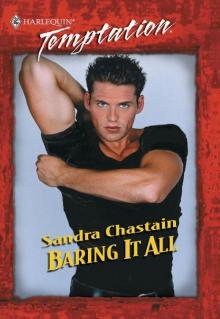 Baring It All (Mills & Boon Temptation)
Baring It All (Mills & Boon Temptation) Adam’s Outlaw
Adam’s Outlaw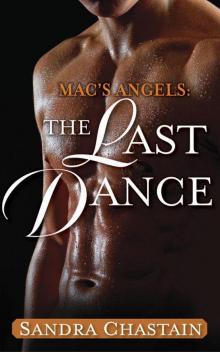 Mac's Angels: The Last Dance: A Loveswept Classic Romance
Mac's Angels: The Last Dance: A Loveswept Classic Romance Imaginary Lover
Imaginary Lover The Judge and the Gypsy
The Judge and the Gypsy Silver Bracelets: A Loveswept Contemporary Classic Romance
Silver Bracelets: A Loveswept Contemporary Classic Romance Penthouse Suite
Penthouse Suite Lean Mean Loving Machine: A Loveswept Classic Romance
Lean Mean Loving Machine: A Loveswept Classic Romance Joker's Wild
Joker's Wild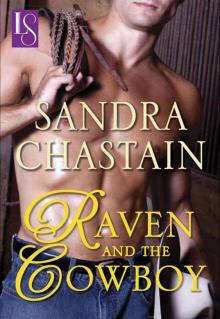 Raven and the Cowboy: A Loveswept Historical Romance
Raven and the Cowboy: A Loveswept Historical Romance Night Dreams
Night Dreams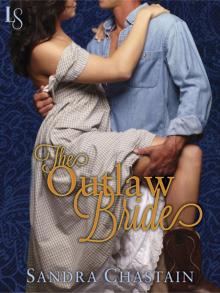 The Outlaw Bride
The Outlaw Bride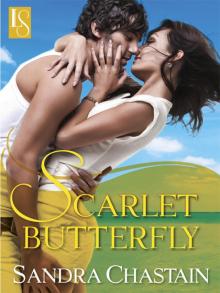 Scarlet Butterfly
Scarlet Butterfly Mac's Angels
Mac's Angels Run Wild With Me
Run Wild With Me Lean Mean Loving Machine
Lean Mean Loving Machine